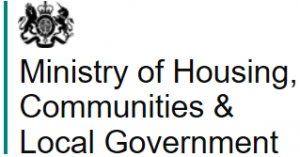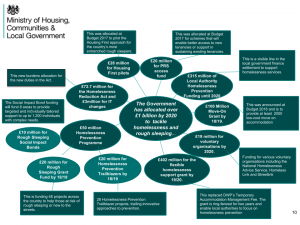Manchester Partnership Meeting
Presentation & Workshop 24/01/18
In attendance, representatives from: Mustard Tree. Shelter. Booth Centre. Riverside. MASH. Street Support. Homeless Link. Centrepoint. CityCo. Justlife. Coffee4Craig. DWP. Manchester City Council. Barnabus. Big Change. GM Police. Greater Manchester Together. Manchester Metropolitan University. NHS. Citizens Advice. Manchester Mind. Cornerstone. Great Places. (This list is not exhaustive).

The Homelessness Reduction Act 2017 (HRA) will be enacted from April 2018. The Act is the most significant change to homelessness legislation since it was first introduced in the 1970’s. The Act places a number of new or strengthened duties on local authorities that are designed to ensure all households at risk of homelessness receive earlier and more effective interventions.
Homeless Reduction Act – Key Changes To Current Legislation
Taken from a presentation given by Jim Crawshaw from the Ministry of Housing, Communities and Local Government on the Homeless Reduction Act. The Lecture Room, Manchester Art Gallery 24th January 2018
DUTY TO PROVIDE ADVISORY SERVICES
Requires free homelessness advice and information services to be provided to all residents AND to provide advice designed with certain vulnerable groups in mind, including care leavers, former armed forces, people leaving custody, victims of domestic abuse, people leaving hospital and people with mental health issues.
Advice must include:
- Prevention of homelessness
- Securing accommodation when homeless
- The rights of applicants and LA duties
- Help available to people threatened with or homeless
- How to access the available help
MEANING OF ‘THREATENED WITH HOMELESSNESS’
Extends the period during which someone might be threatened with homelessness from 28 days to 56 days and; An applicant is threatened with homelessness if they have been served with a valid section 21 notice to end the Assured Shorthold Tenancy of their only available accommodation, that has expired or will expire within 56 days.
PREVENTION DUTY
-
- Local housing authorities (LHAs) must take reasonable steps to prevent homelessness for any at risk eligible applicant, regardless of priority need.
- This can involve assisting them to stay in their current accommodation, or helping them to find a new place to live
RELIEF DUTY
-
- LHAs must take reasonable steps to help the applicant to secure suitable accommodation
- Help could be, for example, providing a bond guarantee, funding a rent deposit or working with a private landlord to make properties available
LHAs cannot refer the prevention duty to another LHA. The relief duty MAY be referred if the applicant has no local connection and does have a connection to another LHA area.
ASSESSMENTS AND PERSONALISED HOUSING PLANS (PHP’s)
LAs must carry out an assessment of the circumstances and needs of all eligible applicants who are homeless, or threatened with becoming homeless within 56 days. The assessment has to be shared with the applicant. A Personalised Housing Plan will be drawn up which sets out the ‘reasonable steps’ the authority and the applicant will take (and other agencies/people as appropriate). ‘Reasonable steps’ should be tailored to the individual and the plan should be realistic
PREPARING FOR THE ACT – CULTURAL CHANGE
Cultural change for everyone is absolutely key, including:
- Frontline Staff
- Advocates & Partners
- Elected Members & MP’s
- Customers
How this can be achieved:
- Training & Awareness
- Strong Leadership
- Getting Staff/Partners on board NOW
- Changing the mindset to assisting everyone as early as possible
PARTNERSHIP WORKING
- Absolutely crucial to delivering the Homelessness Reduction Act
- Duty to refer on ‘Specified Public Bodies’
- Recommendation to open this process to all organisations working with households threatened with homelessness
- Council and partners working together to identify roles and responsibilities – e.g. who can/will complete PHPs etc
- What services should the council refer people to in order to prevent/relieve homelessness?
- Ensure where support needs are highlighted that good referral processes/protocols are in place for early intervention
- Ensure data sharing agreements are in place where necessary
- Ensure effective pathways into supported and permanent accommodation to meet housing duties to prevent and relieve
- Demonstrating outcomes is essential
DCLG support for implementation of the Homelessness Reduction Act
Funded Trailblazers are trying out new approaches to prevention, from the ‘upstream’ projects identifying people at risk of homelessness before they touch housing options services, through to early adopters – LB Southwark and Newcastle City Council
New burdens funding has been increased to £72.7 million following engagement with local authorities around the delivery of the Act plus an additional £3 million to assist with the changes to data collection
Free training is being delivered by the National Homelessness Advice Service (NHAS). Local authorities and third sector agencies can attend
The Homelessness Advice and Support Team (HAST) has been set up to provide additional challenge and support to local authorities in preparation for, and following commencement, of the Act.
The focus of Government on homelessness:
£1 billion by 2020 to achieve these aims

KEY CHANGES
- Makes Homeless Prevention a statutory duty
- Earlier intervention
- Enhanced advice duty
- Must provide prevention services to anyone eligible & threatened with homelessness
- More single people will seek assistance from Councils
- Staff change from investigators to negotiators
- 6 month AST will end Prevention & Relief duties
- Relief duty should end at 56 days and if duty not ended households in priority need and unintentionally homeless will be owed the main duty
- Will see an increase in customers, more casework required though should mean less households owed the main housing duty
There’s now a lot of work to be done as a city to see how this legislation is implemented.
Please see Workshop Outputs